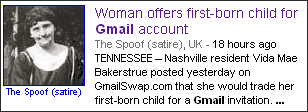Nonsense from the Google Blog:
You’ve probably wondered why there’s never been a Google domain in Norway. As it turns out, our name means „sunglasses“ in Norwegian, and, well, even the non-lawyers can see where this sort of problem leads.
Google does not mean „sunglasses“ in Norwegian — try „solbriller“. Aftenposten has the real story: The Norwegian company SMSfun registered the domain in 2001 when the Norwegian domain registry dropped the tight registration rules. In May 2002, the site carried a short message: „We will soon open the doors to our exciting shop with the most googly sunglasses on the market“. Later that year, google.no turned into a semi-protest, semi-shopping site where you could buy sunglasses with the domain name printed on it. It contained a link to shopstop.no which at that time contained a lengthy explanation by the SMSfun director. Part of it read: „I associated the name [google.no] with the English word for sunglasses, even if after having looked at the english word list I quickly found that it wasn’t quite right.“ Very credible to confuse goggles and Google considering that the search engine already had passed 100 million queries a day at that time. SMSfun won the first court case, but lost the appeal and had to turn over the domain name to Google, Inc.
 Google News lässt, zumindest in der
Google News lässt, zumindest in der